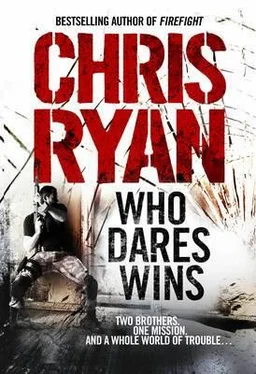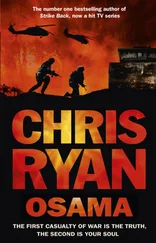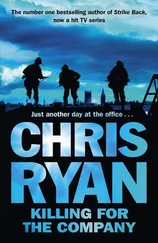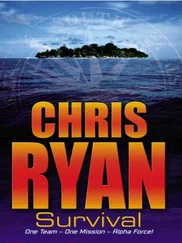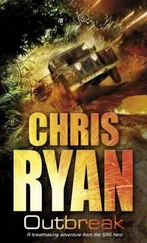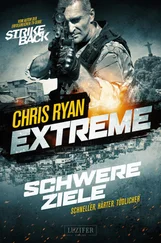Craven’s body was strapped to a stretcher bed attached to the side of the plane; the rest of the gear was stowed underneath. As the men prepared for take-off, the tailgate was already closing. The aircraft had barely been on the ground a couple of minutes before it started to retrace its steps, accelerating quickly up the road. Once it was airborne, it started a sudden, steep incline, ferrying the unit speedily away from the location of their op and back to the relative safety – if safety it was – of the base back in Bagram.
And as the Hercules soared into the air, Sam’s mind was concentrated on only one thing. It was not the op – that was past history now, water under the bridge; it wasn’t the grisly collection of assassinated corpses they’d left in the training camp and on the twiggy floor of the surrounding woods; it wasn’t even Craven’s death, though he carried with him the same nagging sense of loss and anger that he knew they were all experiencing.
It was this: the image of one man, bearded and dark-eyed, running with fierce desperation through the unfamiliar surroundings of Kazakhstan. His blood would be pumping. Most likely he would be more than a little scared. His mind would be focussed on the road ahead; on surviving; but equally he would be keeping one eye behind him.
Because once somebody has been sent to kill you, you never stop looking over your shoulder.
Run.
Jacob Redman kept that one thought in his mind. It was difficult, because other thoughts were jostling for attention. The Regiment, out there to kill him. To kill all of them. Sam. Jesus, Sam . When his brother had appeared, Jacob had thought he was seeing a ghost. What other explanation could there have been for Sam randomly turning up in one of the most obscure corners of central Asia? He didn’t know what the noise was that had woken him up; he did know that if he was in charge of a Regiment unit like that, nobody would have been allowed to stir until the job was well and truly underway. And they wouldn’t be stirring afterwards. No, somebody had made a noise to warn him. It must have been his brother.
He put that thought from his head. Just keep running. It’s all you can do .
He followed the course of the road, but kept away from it, choosing instead to run along the edge of the high hemp fields where his khaki jacket at least would give him some manner of protection. What he would have given for one of the digital camouflage suits Sam had been wearing. But that wasn’t an option. He just had to make do with what he had.
A deafening bang.
Jacob threw himself to the floor, his hands instinctively reaching for his weapon. What the hell was that? Explosives of some kind, back towards the camp. The thunderclap echoed across the skies. What were they doing? Blowing the buildings? He shook his head. Why would they do that? They’d just want to be in and out. He was breathing heavily. There was dew on the hemp fields and it soaked his skin.
He pushed himself back up and continued running. He must have put a good mile between himself and the camp. A little slower now: he needed to conserve his energy and by the sound of it he wasn’t being followed, at least not closely. After another five-minute run he even allowed himself to stop and catch his breath again. It was as he was standing there, his back to the hemp field that he saw it. It seemed to come from nowhere, appearing in the sky like a UFO. And as it passed, perhaps thirty metres above Jacob’s head, the animal roared, a huge, mechanical, whining roar that filled his ears and the skies. Jacob watched it pass, his face impassive. He knew what it was, of course. He’d flown in enough C-130s in his time. Who knows, maybe he’d even flown in that one. A curious mixture of emotions washed over him as he stood there, looking in the direction the plane had been heading. He couldn’t see it any more, but he could imagine it turning, its tailgate opening and the men bundling inside. And he knew it would be back. Three minutes? Four?
He was right. The Hercules had barely passed him the first time before its great shadow appeared overhead once more. Jacob looked up as it rose steeply into the sky, ignoring the battering his ears were taking.
‘Well done, Sam,’ he muttered quietly to himself as once more it disappeared from view. ‘Good lad.’
The Regiment had extracted. It meant Jacob was safe. Or at least safer. He certainly didn’t want to be anywhere near the buildings when it was discovered that they contained a couple of dozen murdered corpses. People all over the world were adept at putting two and two together to make five; but in these rural backwaters even more so. The hemp farmers who brought them their supplies in return for fistfuls of notes knew his face. He needed to put as much distance between himself and the camp as possible; and he needed to make sure nobody saw him do it. He continued to run.
Night was beginning to turn into morning. He cursed the arrival of daylight. It made it more difficult to stay hidden. The road was badly kept and potholed; on either side, the endless hemp fields, deep green.
The half light became full light. Still he ran. Early morning became mid-morning. Still he ran. Seven miles, he estimated. Eight. The sun started to become hot. Jacob’s clothes, which had been damp with the dew, were now soaked with sweat. He needed water, but it was almost midday before he came across the thin trickle of a stream. Every ounce of his being shrieked at him take a few mouthfuls, but he held back. Instead, he followed the trickle upstream for several metres, checking there was nothing in its path to foul the water, before finally, hungrily, swallowing mouthfuls of it down his parched throat. His body gratefully accepted the liquid and he felt revived, like a wilted plant that had just been watered.
It was too hot to run now, so he walked. But he still kept away from the road. He hadn’t seen a single vehicle all morning, but it was safer this way. The sooner he could get to a village, the better. To the best of his knowledge the nearest settlement was about thirty klicks along the road from the camp, but he couldn’t tell how far he had come. Twenty klicks, perhaps? Twenty-five?
It was mid-afternoon before the village appeared up ahead, shimmering slightly in the warmth. Jacob stopped at a distance, squinting at the settlement for a while before planning his next move. He couldn’t stop people noticing him walking into town, with his unkempt, sweaty hair and beard and his dirty clothes. But if he came from this direction, and people started asking questions, he might find them difficult to answer. So he turned away from the road into the surrounding fields, and circumvented the village at a distance of about a mile. It took him an hour to rejoin the road on the other side, but it meant he could enter town from the north, putting any inquisitive villagers off the scent.
It was a poor, featureless place. A network of telegraph poles dominated the sky, criss-crossing over the buildings like a cat’s cradle of wires. Below them, the buildings themselves were irregular but simple – breeze-block constructions, most of them, some rendered and painted white, the majority left a bland concrete grey because that was cheaper. They had high-pitched roofs, made mostly of corrugated iron; and shutters, some of which had been painted in bright colours.
The main road bisected the village; in the centre was a junction from which other, smaller roads, little more than dirt tracks, spread out. The ground on the side of the roads and around the buildings was a thick, dusty sand. Aside from a few trees, there was little in the way of greenery.
Jacob attracted plenty of stares as he strode into the village – grizzled male Kazakhstanis mostly, with Mongol-looking faces, weathered skin, old clothes and beaten-up baseball caps embroidered with the names of American cities they would never see. They certainly didn’t look friendly, but that, Jacob knew, was the way of villagers the world over. He ignored their stares as he continued into the centre of the village.
Читать дальше
